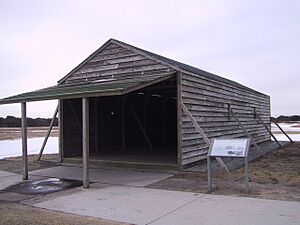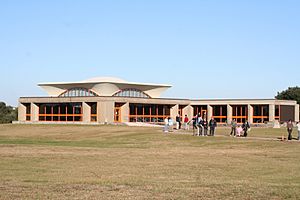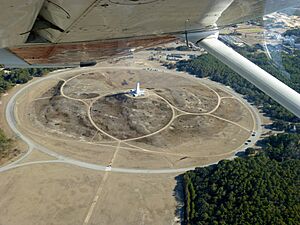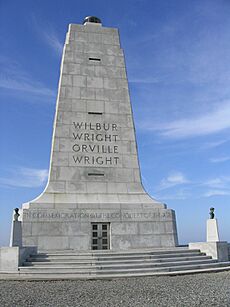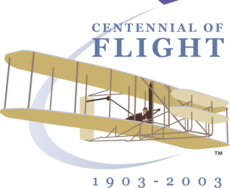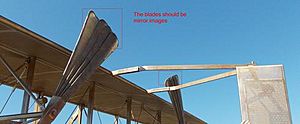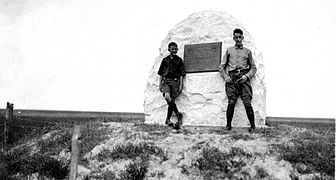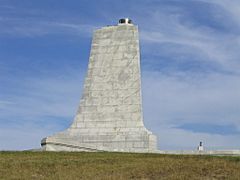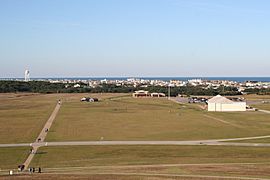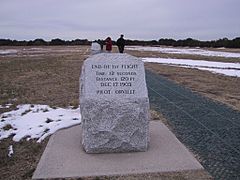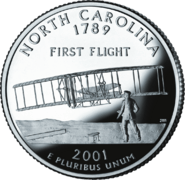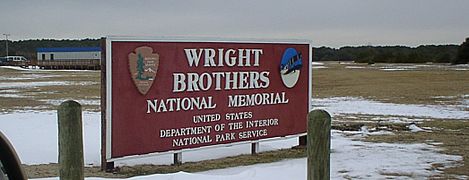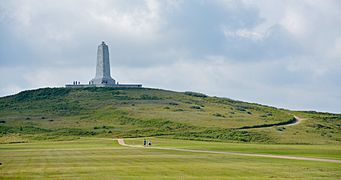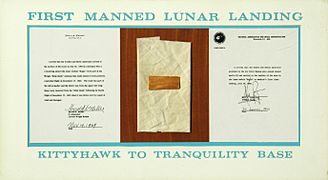Wright Brothers National Memorial facts for kids
|
Wright Brothers National Memorial
|
|
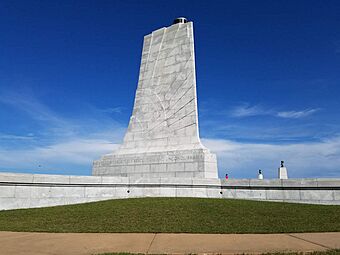
Monument at Wright Brothers National Memorial
|
|
| Location | 1000 North Croatan Highway Kill Devil Hills, North Carolina. |
|---|---|
| Area | 428 acres (173 ha) |
| Architect | Robert Rodgers and Alfred Easton Poor |
| Architectural style | Art Deco |
| Visitation | 406,593 (2024) |
| NRHP reference No. | 66000071 |
Quick facts for kids Significant dates |
|
| Authorized | March 2, 1927 |
| Added to NRHP | October 15, 1966 |
| Designated NMEM | December 4, 1953 |
| Designated NHL | January 3, 2001 |
The Wright Brothers National Memorial is a special place in Kill Devil Hills, North Carolina. It celebrates the amazing achievement of the Wilbur and Orville Wright. Here, they made the very first successful, controlled flights in an airplane!
From 1900 to 1903, the Wright brothers traveled from Dayton, Ohio, to North Carolina. They chose this spot because the U.S. Weather Bureau said it had steady winds. It was also a quiet, private area, far from big cities, which was perfect for their secret experiments.
Contents
The Story Behind the Memorial
This memorial was first approved on March 2, 1927, and called the Kill Devil Hill Monument. Later, on December 4, 1953, Congress officially renamed it the Wright Brothers National Memorial. It became a national memorial to honor the brothers' incredible work.
The memorial is managed by the National Park Service. This agency takes care of many important historical places in the United States. The land and buildings here were added to the National Register of Historic Places on October 15, 1966. The special building where visitors learn about the Wright brothers, called the visitor center, was also recognized as a National Historic Landmark on January 3, 2001.
What You Can See and Do Here
The Flight Field and Hangar
On December 17, 1903, the Wright brothers made four historic flights. They took off from flat ground near the base of Kill Devil Hill. Before this, they spent three years testing gliders from the top of this hill and other sand dunes. Today, small markers show where each of their four flights started and ended.
You can also see two wooden sheds that look just like the ones the brothers used. One was the world's first airplane hangar, where they kept their plane. The other was where they lived during their experiments.
The Visitor Center and Museum
The Visitor Center has a museum full of cool exhibits. You can see models and tools the Wright brothers used. There's even a copy of their wind tunnel, which helped them test different wing shapes. You can also see a part of the engine from their first flight!
Inside one part of the Visitor Center, there's a life-sized copy of their 1903 Wright Flyer. This was the very first powered aircraft that could be controlled in the air. The real Wright Flyer is in the National Air and Space Museum in Washington D.C.. There's also a full-size model of their 1902 glider, which Orville Wright himself helped build. On the walls, you'll find pictures of other brave people who helped make flight possible.
The Visitor Center building itself is quite famous. It was built in a modern style as part of a big program called "Mission 66" by the National Park Service. Its design was very new for its time and helped make its designers well-known.
Kill Devil Hill and the Memorial Tower
On top of Kill Devil Hill, there's a tall, 60 feet (18.29 m) granite monument. This hill was once a big, shifting sand dune where the Wright brothers did many of their glider tests. The monument was built in 1932 to remember their amazing achievement.
Around the base of the tower, you can read a special message: "In commemoration of the conquest of the air by the brothers Wilbur and Orville Wright conceived by genius achieved by dauntless resolution and unconquerable faith." At the very top of the tower, there's a light, just like a beacon on a lighthouse.
The tower's doors are made of strong stainless steel. They have six special pictures carved into them, showing different ideas about flying:
- On the left door (from top to bottom):
- An idea from a French locksmith named Besnier, who thought he could fly with paddles on his arms and legs.
- A tribute to Otto Lilienthal, a German inventor who sadly died while testing gliders.
- A story from Cyrano de Bergerac, a French writer who imagined flying using bags filled with morning dew.
- On the right door (from top to bottom):
Building the Memorial Tower
The tower was designed by architects Robert Rodgers and Alfred Easton Poor. Before building began, the area needed to be prepared. Captain William H. Kindervater helped plant Bermuda grass to keep the sandy hill from shifting. He also used special fertilizer to help the grass and shrubbery grow. A fence was built to stop animals from eating the new plants.
Construction of the tower started in October 1931. It was a big job, using 1,200 tons of granite, over 2,000 tons of gravel, more than 800 tons of sand, and almost 400 tons of cement. The granite came from a quarry in North Carolina. The memorial was finished in November 1932.
Dedication Ceremony
The memorial was officially opened on November 14, 1932. Even though it was a stormy day, about 1,000 people came to celebrate. Orville Wright himself was the special guest of honor! A famous aviator named Ruth Nichols helped uncover a plaque on the monument. President Herbert Hoover couldn't be there, but a letter from him was read aloud. It was a rare moment because one of the people the memorial honored, Orville Wright, was still alive to see it.
Keeping the Memorial Strong
In 2008, the memorial got some important repairs. It had problems with water leaking, so new ways to control water were added. The lights inside were made better, and an old map of early flights was fixed. Sometimes, visitors can even go up inside the tower by making a reservation.
Celebrating 100 Years of Flight
On December 17, 2003, the park celebrated the 100th anniversary of the first flight! Actor John Travolta hosted the ceremony. Famous guests included President George W. Bush, astronauts Neil Armstrong and Buzz Aldrin from Apollo 11, and test pilot Chuck Yeager.
A special building called the Centennial Pavilion was built for the celebration. It had exhibits about the Outer Banks long ago and how the 1903 airplane was developed. NASA also had displays about aviation and space flight. Above the stage, there were words from Buzz Aldrin: "From Kitty Hawk to the Moon in Sixty-Six years." The Centennial Pavilion was closed in 2014.
The State of North Carolina gave a special sculpture for the celebration. This life-sized sculpture shows a full-size copy of the 1903 Wright Flyer at the exact moment it took off. It includes the Wright Brothers and members of the Life-Saving Station who helped move the plane. It also shows John T. Daniels, who took the famous photo of the first flight.
Gallery
-
Small pieces of fabric and wood from the Wright Flyer traveled to the Moon in 1969 with Apollo 11.
See also
 In Spanish: Memorial nacional a los hermanos Wright para niños
In Spanish: Memorial nacional a los hermanos Wright para niños
 | Kyle Baker |
 | Joseph Yoakum |
 | Laura Wheeler Waring |
 | Henry Ossawa Tanner |




